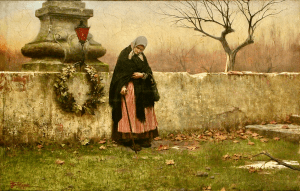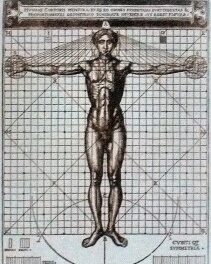We support our Publishers and Content Creators. You can view this story on their website by CLICKING HERE.
There is no want of faith in fear of death—in fact, it is right to fear it and shrink from it, since death has come into the world through sin. But the fear can gradually be tempered by hope, and reduced as we grow in Christhood and in love for God, because Christ, by surrendering Himself in His human nature to death, has made it not only a punishment but a doorway to life.
The Letters of Caryll Houselander, edited by Maisie Ward (216 pages, Cluny Media)
I do know all about the terrible depression you speak of, as I suffer from it too, and have done so ever since I was nine years old or so, on and off; and I realize that while the attack lasts, nothing can either stop it or relieve it.
But one is not helpless, all the same. First of all, there are natural causes which aggravate it terribly, and one has a duty to try to use what natural means one can to lessen the attacks. The greatest natural cause of them is, quite simply, fatigue.
You must start by re-ordering your life, in order to use your vitality and your psychological energy more economically. I am certain that you are living above your psychological income, and have done so for years.
You can’t, at the moment, alter your circumstances, but you can alter something in yourself. You live every moment of the day at top speed, too fast, crowding too much emotion, anxiety, even good will, into every moment. You ought to slow down. God has given you a pretty good hint with your foot. But it is not enough to work at half-speed; you must deliberately practice thinking at half-speed, praying at half-speed, talking at halfspeed. I should suggest resolving to say not more than one Our Father and one Hail Mary a day, and go on saying it all day, dwelling slowly, deliberately, first on every phrase, later over every word. Do not be put off or perturbed by distractions. Just go on where you left off when you think of it. On days when even a kind of “free association” of thoughts about these two prayers fails you, slow up by taking deep breaths between each word, and just repeat the prayers, word by word, breathing deeply between each word as often as you like.
Now—and this will seem harsh advice—when some joy comes your way, and you feel really happy or fervent, slow that down too; don’t let it rip, put the brake on and take it very quietly. The reason for this is that people of your temperament often exhaust themselves as much in letting out all their sail in happy things as they do through unhappy ones; and because they have tired themselves out in, say, a day of fervour, the fatigue which follows is increased in proportion, and the fatigue sets the measure of the intensity of the depression.
Next, bring all the rest you can into enduring the very real and great sufferings of your family life. Stop trying to think out a solution for the moment: there isn’t one. One day there may be; God will then show it to you. In the meantime, accept it all as being the big thing for God and His Church that He asks of you—that, and the depression too. You will find the relief of merely accepting, instead of struggling, wonderful; and I include in this, accepting anything in yourself, during the crisis, which seems to you a failure or fault. Don’t exonerate yourself, but just say you are sorry, briefly, to God, and add that your name is dirt—that’s what is to be expected from you—but you’re sorry, you are forgiven, and it is over.
During the war I was simply terrified by air raids, and it was my lot to be in every one that happened in London—sometimes on the roofs of these flats, sometimes in the hospital.… I tried to build up my courage by reason and prayer, etc. Then one day I realized quite suddenly: As long as I try not to be afraid I shall be worse, and I shall show it one day and break; what God is asking of me, to do for suffering humanity, is to be afraid, to accept it and put up with it, as one has to put up with pain (if it’s not druggable) or anything else. I am not going to get out of any of the suffering. From the time the siren goes until the All Clear, I am going to be simply frightened stiff, and that’s what I’ve got to do for the world—offer that to God, because it is that and nothing else which He asks of me.
From that hour it became easy. I was terrified, but I was also perfectly conscious of being held in God’s hands; before, I was too tensed to feel them. From the moment I just let go, I knew I was held up, and there was nothing more to worry about.
I am sure that what God is asking of you is your suffering; this brings you into immediate communion with all the martyrs, known and unknown, suffering today for the Faith. It is, if offered in reparation, the deepest possible form of contemplation and the most powerful apostolate. It is the very power of Christ, standing as Priest and Redeemer before God.
All that you speak of—fear of death, anxiety about sin, etc.—can be included in this suffering. Don’t try to mitigate it; accept it, offer it for the world to God. He will take it away when He wants to.
There is no want of faith in fear of death—in fact, it is right to fear it and shrink from it, since death has come into the world through sin. It is against nature and against God’s will; the instinctive shrinking from it which all healthy-minded people feel, is right and goes to prove how we all are really made in the image of God. It is also part of our redemption to fear it. It is a punishment. But the fear can gradually be tempered by hope, and reduced as we grow in Christhood and in love for God, because Christ, by surrendering Himself in His human nature to death, has made it not only a punishment but a doorway to life. Also, He has already died your death and overcome it!
On the purely natural plane, fear of death usually shows natural vitality and health. As we get weaker and iller, we fear it less and less, and hundreds of doctors, priests and nurses testify the fact that death, when it comes, is nearly always merciful and easy. For a Catholic, the Holy Viaticum brings Our Lord Himself to help and makes it easier still, and sheer physical weakness helps!
But no reasoning helps about this fear, I know. Like all the rest, the best is to accept it.
God is showing you a very great favour in giving you such big suffering for His children. I am sure you are among those chosen few who are being asked to reach out invisibly to all those who are in such bitter need of spiritual help today—and this is so much more than any specific little good work or “Catholic Action” you could do.
Accept it all as Our Lord did His own Passion in Gethsemane. He experienced all this fear, asked to be let off, and when He wasn’t He surrendered every fibre of His being to God’s will. Repeat His prayer, in His power, in the power of His risen love, which is yours if you choose to use it: “Not my will—but thine.”
Of course I realize how heroic all this sounds and what a lot it asks of your poor human nature, but in it is the seed of peace: and do not forget that, in our Christ-life as in His historical life, the Resurrection must follow swiftly on the crucifixion.
This essay is taken from The Letters of Caryll Houselander, edited by Maisie Ward. Republished with gracious permission from Cluny Media.
Imaginative Conservative readers may use the code IMCON15 to receive 15% off any order of not-already discounted books from Cluny Media.
The Imaginative Conservative applies the principle of appreciation to the discussion of culture and politics—we approach dialogue with magnanimity rather than with mere civility. Will you help us remain a refreshing oasis in the increasingly contentious arena of modern discourse? Please consider donating now.
The featured image is “Pink Roses, Chinese Vase” (1916) by Samuel Peploe, and is in the public domain, courtesy of Wikimedia Commons.

 Conservative
Conservative  Search
Search Trending
Trending Current News
Current News 






